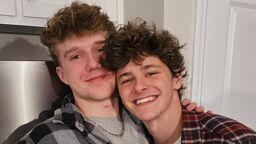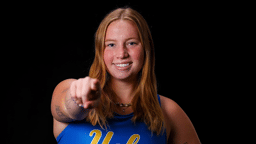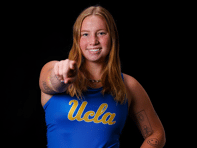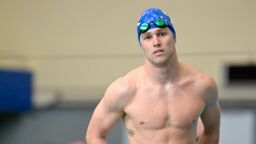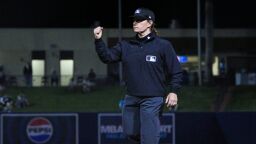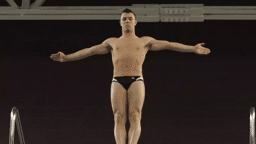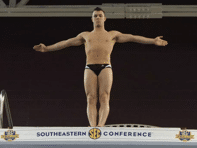I grew up playing sports, but golf was always special. My dad loved the sport, and taught me how to play from a very young age. We had years of great bonding that I’ll never forget, memories I carried with me until high school.
I had gone to golf camps every year, competed in different kid’s league tournaments, and had enough practice that I made it on the team my freshman year of 2011-12. I was very excited to do something I truly enjoyed on a high school level, and I practiced with my dad the summer before school.
Things did not go very well, though. Early in the school year, I was outed as gay by a guy I had trusted and thought would keep my secret. The news spread quickly in my small high school, and within a few days everyone knew.
The response was harsh. People would make fun of me, call me names and tell me I was too ugly to be gay. Guys would yell profanities at me in the hall and threaten to beat me up for no reason.
It was traumatizing to have something so private and scary suddenly released to everyone. I had known I was gay for years at that point, but had no intention of being out. Growing up in the small farm town of Plainview, Texas, was not the most acceptable place for a gay person to fit in.
I felt completely alone and devastated. I hated myself for being gay, and wanted to just be normal more than anything.
I felt completely alone and devastated. I hated myself for being gay, and wanted to just be normal more than anything. I tried so hard to convince other people, and myself, that I wasn’t gay, that it was just a rumor. Nobody believed me. They just kept laughing.
During this time, members of the JV golf team at Plainview High School instantly descended on me. A sport that once made me feel calm, relaxed, and at home now gave me painful knots in my stomach.
Every day after school, five or six guys would yell “FAGGOT!” and tell me to go home. They would threaten me and tell me I wasn’t allowed to be there. They would grab my hat or glasses and throw them on the ground, or run at me somewhere on the course, push me to the ground and yell in my face.
After a few weeks, they started grabbing my clubs out of the locker room and throwing them, scattering them all over the ground, down a hill, into bushes. I bought a padlock and started locking my clubs into the locker just so no one could get to them, but they still managed to grab something from my bag, because there were five of them against me. My golf balls were thrown into ponds, sometimes my hat or sunglasses; anything they could do to harass me, they did.
I hated my life. I hated myself. I hated going home because I knew I’d have to wake up and go to school. Guys in my class would take pictures of me and write “faggot” under the photo and send it to people. After school, the team would yell, steal my things or push me to the ground. Even the kids and parents in my youth group would tell me I wasn’t welcome.
I don’t know how many times I was told to get lost, and that I was going to hell. I couldn’t have gone to my coach because telling him would have made my situation worse. He likely would have gone to those team members and maybe punish them, but ultimately make them resent me more. If they knew I told our coach, they would have harassed me even more, possibly even at school and not just practice. Out of fear, I just didn’t tell anyone.
Youth group leaders didn’t talk to me, and I never told my parents what was going on because I was completely mortified. My family life was good, but the thought of telling my mom and dad that I was being bullied made me feel horrible. I was totally alone in this struggle, and I had no idea what to do. I wanted them to know as little as possible of my situation because I was so embarrassed.
At the end of my freshman year, I had lost any feeling I had for golf.
I was completely rejected by my peers, my church family and my golf team, all within a few months. I stopped trying at practice, and quickly lost my JV spot. I stopped talking to people and trying to make it better. I gave up, and started to resent myself for being gay. At the end of my freshman year, I had lost any feeling I had for golf, and gave up hope on ever receiving a scholarship. I never stepped back onto the golf course and kept to myself for the next three years.
The day-to-day harassment finally ebbed, and I was eventually able to go to class without people asking me why I liked guys, calling me names and telling me I was wrong. It still happened, but not every day. Unfortunately, the damage was already done, and I hated myself for being me.
My depression turned severe by my senior year, and all I wanted to do was move far, far away from town. People from all around told me I wasn’t welcomed and that I was wrong for being myself, so I left. I applied to only one college and moved by myself to Denver, Colorado, in hopes of starting over.
My depression and self-loathing didn’t go away, because moving doesn’t simply fix that, and after a year of suicidal thoughts and generally despising myself, I finally sought help at my school’s counseling center.
Counseling completely changed my life, something I never thought would be possible. I started going weekly, but after 11 months, I was able to go every other week. I still battle depression and dark thoughts, but I am slowly getting better. I might one day start playing golf again, although I’m probably going to be pretty rusty.
The only thing that helped me through the darkest time of my life was a tiny sliver of hope that I could one day change it.
The only thing that helped me through the darkest time of my life was a tiny sliver of hope that I could one day change it. Removing myself from a toxic environment was only the first step, but I couldn’t stop there. One thing that helped was my family, which now knew I was gay and that made a very good relationship even stronger.
I hope by sharing this that I can possibly help someone who has also felt worthless, unloved, and hopeless. Fighting depression is an incredibly hard battle, but taking small steps every once in a while is better than nothing. Reaching for help is not shameful, and mental illness is not bigger than you. Just like a sport, it can be conquered.
Payton Bradley, 21, is studying English and Sociology at Metropolitan State University of Denver. He can be reached at: [email protected] or on Instagram: payton_co
Story editor: Jim Buzinski





